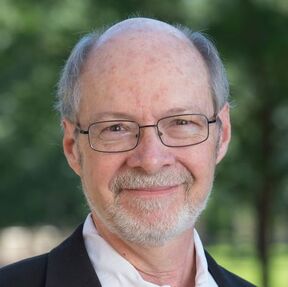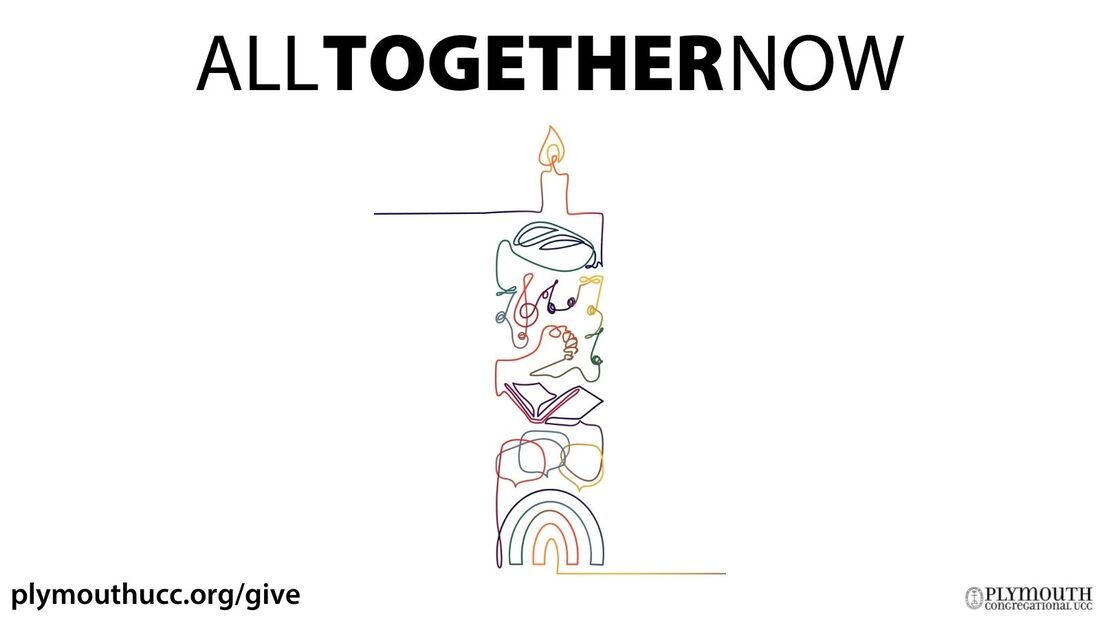|
It is an age-old observation that most can relate some piece of music to one's lived moments both big and small. Childhood birthday party? Yes, that tune. A traditional wedding? Wagner's contemporarily-entitled "Here Comes the Bride" or the seemingly mandatory inclusion of Pachelbel's "Canon in D" comes to mind. One's involvement in the 1960's civil rights movement? "We Shall Overcome" easily rises to the surface. And so many more distinctly personal selections to one's life soundtrack. Music can even act as an impetus for dramatic life change. For me, hearing Joseph Jongen's "Sonata Eroica" brilliantly performed in a recording by organist Todd Wilson showed me that a degree path in organ performance could be a worthy and exciting path to undertake way back in 2003. And it still provides reliable inspiration when needed. In our liturgical year, we mark the events of Jesus' life and that of the universal church in a three year cycle of scriptural readings. For myself, I find this to be a powerful and meaningful tool to program music for worship. My earliest associations with worship in my Lutheran upbringing was the intentional ever-evolving tone throughout the year: introspection and anticipation in Advent and Lent culminating in celebration and joy (both quiet and unbridled!) with Christmastide and the Easter season. Not only does it make for a nuanced beautiful musical tapestry in worship week to week, but more importantly, it brings us closer to the story of Jesus and the witnessing church. As we approach Totenfest/All Saints Sunday and, soon, the Advent season, perhaps a certain hymn or piece of music enters your mind? An association with the majestic Ralph Vaughan Williams' tune in "For All the Saints" is a common one as we remember those saints who have gone on before. It would be difficult to imagine Advent without the longing strains of "O Come, O Come, Emmanuel" to usher us into the season. The Church has the unique position in this world to mark the occasion of every moment of our lives. It is a blessing to be in such a community and to then share that light with all. Mark AuthorMark Heiskanen has been Plymouth's Director of Music since September 2017. Originally from Northeast Ohio, Mark has experience and great interest in a diverse range of musical styles including jazz, rock, musical theatre, and gospel. He is thrilled to serve a congregation and staff that values diversity and inclusion in all facets of life. Mark's Music Minute can be read here. “What are you grateful for, Daddy?” I remember my son Chris’s then-small voice coming across the dining room table as we blessed our dinner. Each of us, in turn, would give God thanks for the things we were grateful for, whether a special moment, a kind word, a dear friend…or a new Lego. I am grateful for those moments of childhood wonder in my sons, who are now young men in their 20s. Many years ago, my mom wrote a mealtime blessing that I didn’t fully appreciate until I was an adult…when I stopped taking life’s blessings for granted. “For love and friends, for home and health, we are most thankful for this wealth. Teach us, Lord, to be kind to all, and to appreciate your bountiful blessings. Amen.” My mom was no theologian, but I remain thankful for her words and for the fact that she and my dad shared the experience of a life of faith with me and my siblings. I am grateful today for the United Church of Christ and its bold, faithful witness across hundreds of years. I am thankful for Second Congregational UCC in Greenwich, Connecticut, where I was confirmed and for First Congregational UCC in Boulder, where I was ordained. I am grateful for all the people who reflected God’s love and helped me become who I am today. I am grateful today for Plymouth…for the generations of people on whose shoulders we stand today. For the Volgadeutsch immigrants who founded this church with the help of the Congregational Board for Homeland Missions, which reached out to immigrant communities. I am grateful for the ministry of my predecessor, Fred Edmonds, who served Plymouth for 23 years and helped transform it into a congregation with a heart for social justice. I am grateful for the hundreds of people who form this church today and that it is a beacon for progressive Christianity in northern Colorado. It’s important to say, “Thanks!” isn’t it? It’s important to express our gratitude, both in word and in deed. “Thanks” to all the people who nurtured us along our life’s path, to the people whose hard work built the church where we now worship, to the people with whom we are bound in covenant. A few weeks ago, I included this sentence from Desmond Tutu as our Call to Worship: “What we are, what we have, even our salvation…All is gift; all is grace, not to be achieved, but to be received as a gift freely given.” Who is the giver? Who makes the gift of life itself possible? Just as it is important to thank the folks who help us along life’s journey, it’s important to say “Thanks!” to God as well, which is why an offering is a part of our worship. In non-pandemic times, we sing our offering forward with a Doxology: “Praise God from whom all blessings flow!” What are the ways you say “Thanks!” to God? This Sunday is Consecration Sunday, when we ask for God’s blessing on our pledges of financial support for our congregation in 2022. It will be a celebration you won’t want to miss, either online or in person, with Beatles and Burritos! It has been an incredibly tough 20 months of pandemic for all of us, but I am grateful that God has not abandoned us, nor have we abandoned one another. We are making it…something that none of us could do on our own. We are All Together Now! Things still aren’t back to normal, but aren’t you grateful for the ways we are able to connect at Plymouth and with God, even now? I hope you’ll join me this Sunday as we celebrate, offer thanks, and consecrate our pledges for 2022. With gratitude,  P.S. If you can’t be with us on Sunday, you can pledge online anytime! Just go to plymouthucc.org/pledge or take a picture of this QR code with your smartphone. AuthorThe Rev. Hal Chorpenning has been Plymouth's senior minister since 2002. Before that, he was associate conference minister with the Connecticut Conference of the UCC. A grant from the Lilly Endowment enabled him to study Celtic Christianity in the UK and Ireland. Prior to ordained ministry, Hal had a business in corporate communications. Read more about Hal. Looking around, Jesus said to his disciples, "It will be very hard for the wealthy to enter God's kingdom!" His words startled the disciples, … "Children, it's difficult to enter God's kingdom! It's easier for a camel to squeeze through the eye of a needle than for a rich person to enter God's kingdom." They were shocked even more …, "Then who can be saved?" Jesus looked at them carefully and said, "It's impossible with human beings, but not with God. All things are possible for God."… Peter said to him, "Look, we've left everything and followed you." … [Jesus said,] “…many who are first will be last. And many who are last will be first." Mark 10.23b -25, 28, 31 * I don’t know about you, but Hal’s sermon this past Sunday really challenged me to think again… and again and again….about my financial resources. Hal and I may live in the same house, but we rarely hear each other’s sermons before the worship services on Sunday morning. We often surprise one another. Echoing Jesus’ words, Hal’s words us challenged how we look at ourselves and at our lives as Americans. None of us may be in the top 1% of the wealthiest, but we are in the top echelons of the wealthy in comparison to most of the world’s people. If we have a place to live, food to eat, education, healthcare of some kind and opportunity for work – and meaningful work at that - we can consider ourselves “rich.” The difficulty of being “rich” in our world is that it has the potential to cut us off from the wealth of God’s kin-dom or realm that is here and now on our earth. The possessions and accoutrements of first world wealth, even middle to upper middle class wealth, can distract us from seeking God first in our lives. We get distracted with taking care of houses and cars, etc., etc. We are distracted with worrying about investments or getting ahead in jobs so we can make more money. We think we have built our small “kingdoms” of family and resources all by ourselves. We forget that God is the giver of all we have! Living in God’s economy, in God’s song of abundance, there is more enough for all! Jesus invites those of us who are “first” in line in the world’s eyes to move to the back of the line. My imagination shows me a line of people waiting to receive food — perhaps in a buffet or cafeteria situation or maybe it’s an abundant potluck. Some of the people are emaciated and look as if they have not eaten for days while others are healthy and robust. It is quite apparent that there is enough food for all on the table. Which group should go first in line? It is too obvious for words. Yet this is not the justice in which our contemporary competitive systems always operate, is it? Even if we care deeply about changing the world for justice, we are often overwhelmed by the challenge. What is an action item we can each do to move from “first” to “last” even as we remember that there is really no linear order in God’s realm. We are ALL God’s people interconnected in love. What can we do – each of us, right now? We can consider our resources, their abundance. Some of us are at a more abundant time in life than others, true, yet we all have something to give. And we can each give out of what we have to build the ministry of Plymouth as part of God’s realm on earth. What can you give that challenges you to acknowledge and celebrate God’s abundance? $10 a month? $25? $100? $150? $300? $500? $1000? More? Give out of prayerful consideration, out of a full and grateful heart! Yes, you will be helping others as our budget dollars go to our Outreach and Mission partners, to supporting the spiritual formation of children, youth and adults, to facilitating inspiring worship, to building the administrative infrastructure of our church that provides transparent communication and a solid logistical foundation for our ministries. More importantly, you will be intentionally remembering that your whole self, body, mind and soul, live and move and have their being in God and God’s Spirit of Abundance. The prophet Amos reminds us. Seek the LORD and live, … Seek good and not evil, that you may live; … the [Holy One], will be with you. (Amos 5. 6a,14a) “All things are possible for God," says Jesus. Even giving more than we might imagine at first glance that we can give! Take the challenge with me, *Bible, Common English. CEB Common English Bible with Apocrypha - eBook [ePub] (Kindle Locations 39604, 39607-39608). AuthorThe Rev. Jane Anne Ferguson, Associate Minister, is a writer, storyteller, and contributor to Feasting on the Word, a popular biblical commentary. She is also the writer of sermon-stories.com, a lectionary-based story-commentary series.  I was brought up in a Reformed Church in America (same denomination as our Visiting Scholar Wes Granberg-Michaelson) church and family in the Chicago area in the 1950s. The RCA is part of the John Calvin-inspired “reformed” wing of the Protestant Reformation, as were the church reformers (and revolutionaries!) in England and Scotland in the late sixteenth and early-mid seventeenth centuries. Some of those dissidents would come to New England in the 1630s and form congregations, and we at Plymouth trace part of our lineage to the “congregationalism” of those emigrants. Since then, Congregationalism has “gentled” its Calvinist heritage, particularly around the doctrine of original sin and, especially in our own time, has tended to stress the belief that we are “made in God’s image,” a rather different emphasis than “all have sinned and fallen short of the glory of God.” In my life, I’ve wrestled with these two tendencies: the sense of human limitation (including and especially my own) and the sense of human possibility. I see them now not as polar opposites, but as parts of our same complicated selves. What is true of individuals, I think, is also true of groups and organizations: always limited, often falling short, always full of possibility to do and be better. I think this has been especially true of Plymouth during this pandemic year of 2021. During this year, as I’ve served as Plymouth’s moderator and chair of the Leadership Council, I’ve gained some new insights into how we “work” as a church community. In particular, I want to share the insights I’ve gained from our Strategic Plan and from our summer consultations. I said this from the lectern a few months ago and I want to reiterate it here: in my years in academia, I’ve seen strategic plans come and go, plans full of lofty and vague language, unattainable (or obvious) goals, destined to be stored in binders on some closet shelf, never to be seen again. But I am convinced that this plan is different: it is the product of a team diverse in its age, experience, and outlook; it is ambitious; it is challenging; and, if we really embrace it, it is transformational. I hope you will participate in an upcoming “congregational conversation” on the plan, soon to be announced. The Strategic Plan unfolded in a summer of “consultations,” so now something about them: Leadership Council asked John Wimberly, our consultant for the Plan, to extend his assignment into the summer to include working with us on staff redesign based on the goals of the Plan. John offered some great insights into “right-sizing” Plymouth’s staff for the future. Among other things, he reminded us of the “great shift” in demographics that Plymouth and all vital churches face as generations grow up, age, and grow old. What will that mean for Plymouth’s program, staff, and outreach? And he reminded us of our location amid college and university communities. What should be our welcoming mission to faculty, staff, and students at our local institutions? Like John Wimberly, the staff of the Lombard Mennonite Peace Center held focus groups of members of the congregation, and both shared their insights with Leadership Council and from me with all of you. There we learned about some things we were doing well as a community and as individuals, and some things we were not doing well. Taking “loving criticism” is difficult, sometimes, under any circumstances, but the pandemic/social isolation circumstances this year have been particularly difficult. All of us, especially on the receiving end of criticism, pondered the words of the participants, took them to heart where possible, and have been working on ways to improve Plymouth’s channels of communication. You’ll see some of these unfolding in the next weeks and months: they include a periodic “Did You Know?” column in the Overview and Sunday bulletin, and periodic “Meet the Mods” informal chat-time with moderators and clergy between and after services. Finally: I want to say “thank you” to members of Leadership Council. It has been a ceaselessly busy, occasionally tumultuous, productive year. To borrow Brooklyn McBride’s language, it’s been like drinking from a fire hose! Up next: the 2022 budget! Bruce Ronda, Moderator AuthorBruce Ronda is Plymouth’s moderator for 2021. Before joining Plymouth in 2010, he attended First Congregational Church in Boulder, Boulder Mennonite Fellowship, Fort Collins Mennonite Fellowship, and the Fort Collins Friends Meeting. |
Details
|





 RSS Feed
RSS Feed